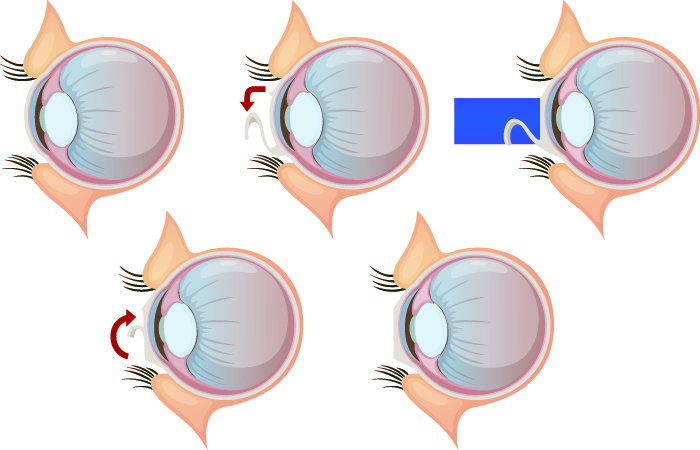Corneal Surgery in Kondapur, Hyderabad
The cornea is the transparent part of your eye from where the light enters your eye. Corneal surgery is done to replace a part of your cornea with corneal tissue from a donor.
This surgery is done to restore vision and remove the damaged part of your cornea.
What is Corneal surgery?
Corneal surgery may be defined as surgery of the cornea of your eye. This surgery is used to restore the vision of an individual whose cornea is damaged.
It can also be useful to relieve pain or signs associated with cornea diseases. Corneal surgery can treat swelling of the cornea, corneal ulcers, cornea scarring or tearing of the cornea.

What Are the Symptoms of Corneal Disease?
The signs and symptoms of cornea diseases include:
- Discomfort or pain
- Red eyes
- Sensitivity to light
- Loss of vision or blurred vision
- Epiphora
What Are the Causes of Corneal diseases?
- Previous transplant in the same eye
- Tear deficiency
- Bacterial infection
- Trauma
- Inflammatory disease
- Glaucoma
- Autoimmune disorders
- Nutritional deficiencies
- Allergy
- Hereditary conditions
When to See a Doctor?
You should immediately go to an eye specialist if you see signs and symptoms which include:
- When your cornea bulges outward, also called keratoconus
- Fuchs’ dystrophy, which is a hereditary condition.
- Tearing or thinning of your cornea
- Cornea scarring is caused by an infection
- Corneal ulcers
- Previous eye surgery complications
Request an appointment at Apollo Spectra Hospitals, Kondapur
Call 1860-500-2244 to book an appointment
What Are the Risk Factors of Corneal Surgery?
Risk factors of corneal surgery include:
- There is a chance of eye infection after corneal surgery
- The donor cornea may be rejected by the recipient’s immune system
- Glaucoma, which is caused due to increase in pressure in the eyes
- Bleeding can be experienced after corneal surgery
- Pain and discomfort may also be experienced
- Retinal problems like retinal swelling and detachment can also be a risk after corneal surgery.
What Are the Treatments for Corneal Diseases?
Treatments for corneal diseases at Apollo Kondapur include:
Superficial Keratectomy (SK): It is a procedure that is used to treat recurrent corneal erosions and anterior basement membrane dystrophy (ABMD). It is done by removing the area of damaged tissue cells which will allow the cornea to regenerate healthier tissue cells. Anti-inflammatory eye drops and antibiotics are prescribed after the surgery.
INTACS: INTACS are plastic segments that are placed within your cornea to correct your vision. It reduces the overall irregularity of your cornea.
Descemet’s Stripping Endothelial Keratoplasty (DSEK): This surgery is less invasive than Penetrating Keratoplasty. It has a shorter recovery time. In this surgery, your eye surgeon will replace the endothelial layer of your cornea with the organ donor’s cornea.
The chance of tissue rejection is less in this surgery because the natural cornea is left intact. The effects of this surgery are fast. You may return your vision within a short span of time.
Penetrating Keratoplasty (PK): This surgery is also known as a Full-Thickness Cornea transplant. This surgery is done when there are no other treatment options available. In this surgery, the doctor replaces the centre of your damaged cornea with corneal tissue from a healthy donor.
This surgery is done to restore vision loss due to an injury or disease.
Corneal diseases are diseases that affect the cornea of your eye. The cornea can repair some diseases on its own but serious and major diseases and injuries require medical attention.
Corneal surgeries can help you recover your vision loss and other cornea related problems. Many factors like heredity, bacteria, nutritional deficiencies, trauma, allergy and glaucoma can worsen corneal diseases.
Corneal diseases are curable with the right medications and surgeries. But severe and major corneal diseases can take a longer time to be cured.
Severe and major corneal diseases can lead to vision loss. But corneal surgery may be used to restore your vision loss.
Yes, most forms of corneal diseases are caused due to hereditary conditions.
Symptoms
Our Top Specialities
NOTICE BOARD
CONTACT US
CONTACT US
 Book Appointment
Book Appointment


.svg)
.svg)
.svg)
.svg)








